The world we live in today is stressful, overwhelming, and constantly demanding more from us.
Every single day feels like a race, and in the middle of all this, taking care of ourselves often feels like an afterthought, something we’ll get to “when there’s time.” But that time rarely comes.
Think about it, how many times have you hesitated to do something for yourself because it felt selfish?
I know I’ve felt this way. For the longest time, I believed that prioritizing my needs was selfish because that’s what we’re conditioned to think.
We’re taught from a young age that taking care of ourselves should come second, or last, after everything and everyone else.
That’s exactly why we need to talk about ways to practice self-care without feeling selfish because self-care isn’t a luxury, and it definitely isn’t something we should feel guilty about.

It’s this deeply ingrained belief that makes us wonder, How do I take care of myself without feeling selfish? or Why do I feel selfish for taking care of myself?
But if we really stop and think about it, how is self-care selfish? It’s not. If anything, it’s necessary. Because when we’re running on empty, how can we possibly show up for the people and things that matter most to us?
It takes time to unlearn old beliefs, and it helps to have simple, practical ways to practice self-care without feeling selfish or battling that guilt every time you do something for yourself.
So, in this post, I’ll share 5 ways to practice self-care without feeling selfish, ways that will help you prioritize yourself without guilt. Because self-care isn’t selfish, it’s what helps us be our best selves for everything and everyone else in our lives.
Let’s get into it!
Why do I feel selfish for taking care of myself?
Ever since I was a kid, I’ve seen firsthand how hard people work. Households didn’t have modern appliances and a lot of the daily chores are still done manually.
Yes, things are improving, most homes now have washing machines, and some of us even have house help for certain tasks. But for the most part, cleaning, cooking, laundry, and other household work are still done by hand.
And in rural areas, where a huge part of our population still lives, modern conveniences are even more limited.
With so much work to do, the idea of just sitting and relaxing feels almost foreign. I’ve watched my parents wake up at 5 AM every single day, going about their routine from morning till night without ever stopping to rest.
Even when they weren’t feeling well, they wouldn’t take a break because, in their minds, the work still needed to get done. I’m sure many of us have seen this in our own families.
And after growing up watching this, it’s no surprise that when we take a moment for ourselves, that nagging guilt creeps in. Why am I resting when I could be doing something productive?
This isn’t just an Indian thing, though. No matter where you’re from, society tends to glorify productivity. We’re conditioned to believe that our worth is tied to how much we do, not how well we care for ourselves.
And that’s exactly why so many of us struggle with self-care because deep down, we’ve been taught that slowing down is selfish. But is it really? Or is it just something we need to unlearn?
How is self-care not selfish?
My husband and I both work corporate jobs, and honestly, our weekdays feel like a never-ending cycle of meetings, deadlines, and overflowing to-do lists.
We count down to the weekend, hoping for a breather, but before we know it, Monday is here again, and the cycle repeats. The Monday blues are so real.
But it’s not just work. Our daily routines have become so sedentary. Most of us start our mornings glued to our phones, scrolling through social media before even getting out of bed.
We rely on packaged food or quick takeout meals because we’re too exhausted to cook. Real-life social interactions are getting replaced by online conversations and physical activity barely makes it onto the schedule.
And then there’s stress, our constant, unwanted companion. Social media is making all this even worse.
We scroll through perfectly curated posts of people with their seemingly perfect lives, and before we know it, we’re comparing ourselves with them. Am I doing enough? Am I successful enough? Is my life exciting enough?
It’s so exhausting.
With this kind of lifestyle with long working hours, high stress, lack of movement, unhealthy eating, and constant comparison, it’s no surprise that mental health struggles are on the rise.
The truth is that if we don’t actively take time to care for ourselves, we’re only making things worse for our overall well-being. How can we expect to live a healthy and happy life if we never prioritize ourselves?
That’s why self-care is not selfish, it’s necessary. It’s how we make sure we’re not just surviving but actually living.
How to not feel guilty about self-care?
We just talked about why self-care is an absolute necessity in today’s world, so why do we still feel guilty about it?
We shouldn’t. If we fall sick and a doctor tells us to rest or take medicine, we do it without questioning or feeling guilty about it, right? Then why should we feel guilty for taking care of ourselves before we reach that point?
Being proactive about our well-being isn’t selfish, it’s smart. It means we’re preventing burnout, stress, and health issues instead of waiting until we’re forced to take a break.
Taking care of ourselves today ensures we don’t reach a stage where our body demands rest.
But first, we need to truly understand what self-care is. It’s not about waiting until we’re overwhelmed and then booking an expensive vacation, indulging in a spa day, or treating ourselves to something extravagant.
Those things are great once in a while, but real self-care is much simpler. It’s about tuning in to what our body and mind actually need at the moment.
If I’m exhausted, self-care might just mean taking a nap or resting without feeling guilty. If I’m feeling anxious, maybe I need to step outside for a walk, journal my thoughts, or spend time doing something I love.
It’s about small and intentional acts that help us feel better without overcompensating with something grand.
As long as we are mindful about what truly nourishes us, without turning self-care into an excuse for extravagance, there’s no reason to feel guilty about it.
In fact, we should embrace it, knowing that prioritizing ourselves allows us to show up better in every other area of life.
5 Ways I take care of myself without feeling selfish?
I’m sharing different ways I take care of myself without feeling selfish. These are not the typical categories of self-care you usually hear about like physical, mental, or emotional self-care.
Instead, these are practical ways to practice self-care in daily life while letting go of the guilt that often comes with it.
1. Shift Your Mindset
The first and most important step in practicing self-care without feeling selfish is to shift your mindset.
Everything we’ve talked about so far boils down to this, understanding that self-care is not a luxury or an afterthought, but a proactive choice to maintain your well-being.
We often think of self-care as something extra, something we do after we’ve exhausted ourselves. But in reality, self-care is what helps us prevent that exhaustion in the first place.
It’s not about indulging in expensive spa days or vacations, it’s about tuning in to what your body and mind need and responding with kindness.
Think of it this way: if you fell sick, you wouldn’t feel guilty about resting or taking medicine, right? Then why feel guilty about taking small steps every day to prevent burnout in the first place?
Self-care is a safeguard, it keeps you from pushing yourself to the point where your body forces you to stop.
Once you start seeing self-care as a necessity rather than a reward, the guilt starts to fade. You realize that taking care of yourself doesn’t mean you’re selfish, it means you’re being responsible for your own well-being.
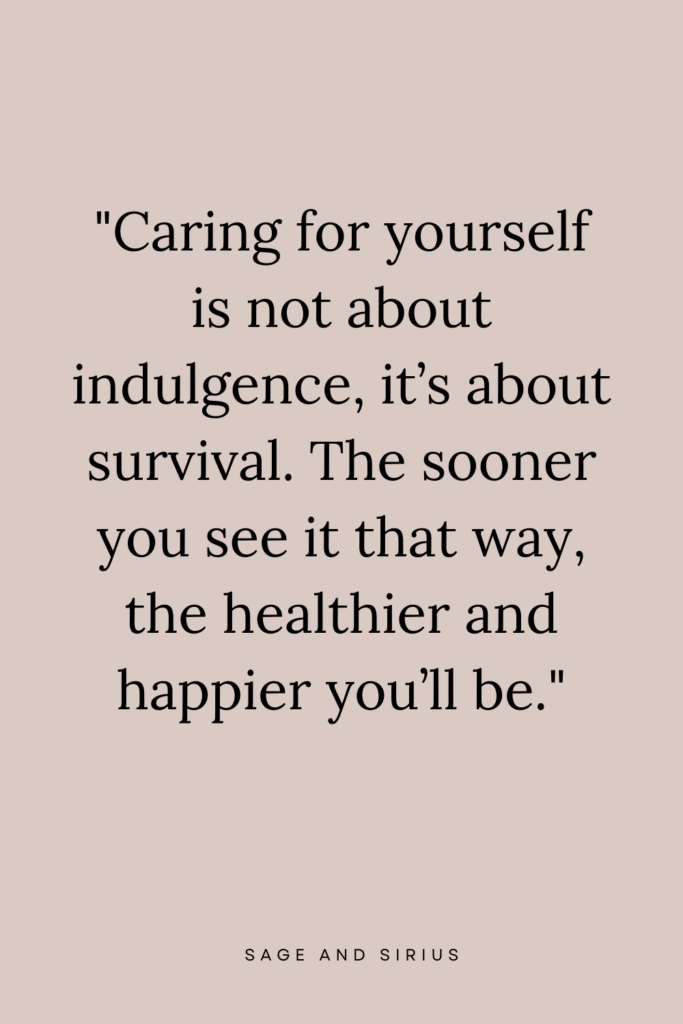
2. Set Boundaries Without Feeling Sorry
The next way to practice self-care without feeling selfish is by setting boundaries and doing it unapologetically. Not just at work, but in every aspect of life.
This is something I personally struggle with. I have a hard time saying no when someone asks me for something.
Whether it’s work-related tasks that stretch beyond my normal hours or friends who want me to tag along for plans I don’t really have the energy for, I hesitate to decline.
And the truth is, I’m paying the price for it. My time, my energy, and sometimes even my health suffer because I put others before myself too often.
I’m not saying that my friends and family don’t care about me. But I’ve noticed that while I make the effort to show up for them, it’s not always reciprocated.
And that’s when I realized, I need to stop overextending myself just to avoid disappointing others.
Setting boundaries isn’t about being rude or selfish. It’s about knowing my limits and respecting them. It’s about understanding that my well-being matters just as much as anyone else’s.
And most importantly, it’s about reminding myself that I don’t owe anyone an explanation for prioritizing my own needs.
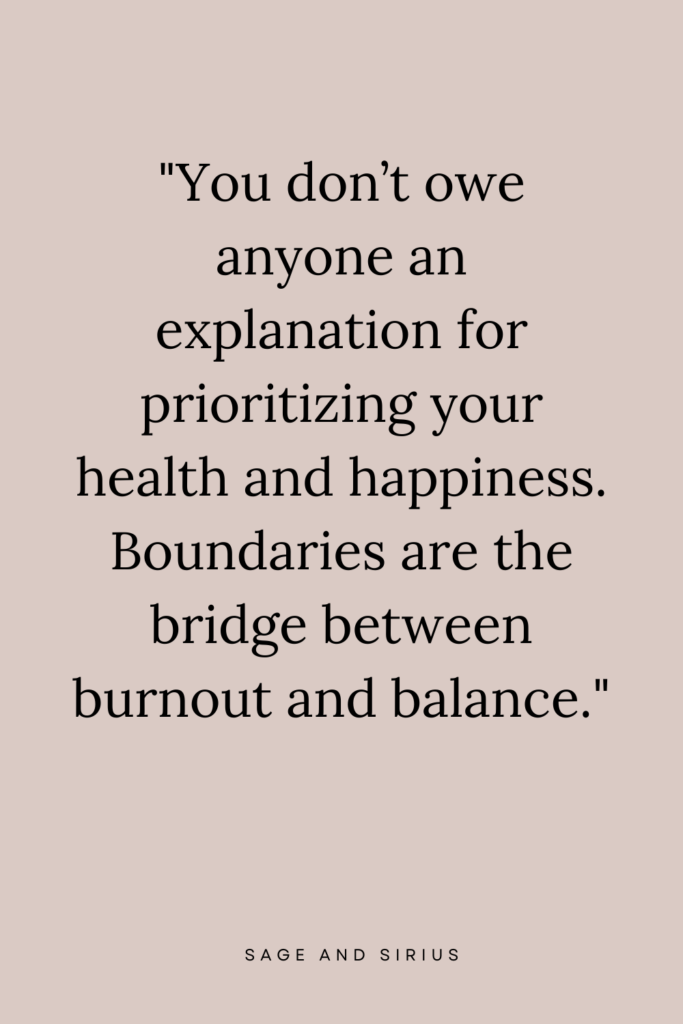
3. Schedule “Me Time” Without Justification
Another important way to practice self-care without feeling selfish is to schedule “me time” without feeling the need to justify it to anyone.
And let’s be clear, me time doesn’t mean going on an extravagant shopping spree or indulging in something over-the-top.
It simply means carving out moments in your day to rest, enjoy your hobbies, or just sit in silence and recharge.
Whether it’s reading a book, journaling, taking a short walk, or even just lying down and doing nothing for a while, it all counts.
The problem is, that we often feel like we have to explain why we’re taking a break. If someone asks what we’re doing, we scramble for a “valid” reason, as if relaxation isn’t enough on its own. But why?
If we don’t owe an explanation for working long hours or helping others, why should we feel the need to justify the time we spend on ourselves?
Of course, this doesn’t mean being rude or dismissive. It’s not about telling people off for questioning us, it’s about reminding ourselves that we don’t need to feel guilty or accountable for prioritizing our well-being.
Taking time for yourself is not a luxury, it’s a necessity, and you don’t have to justify it to anyone.
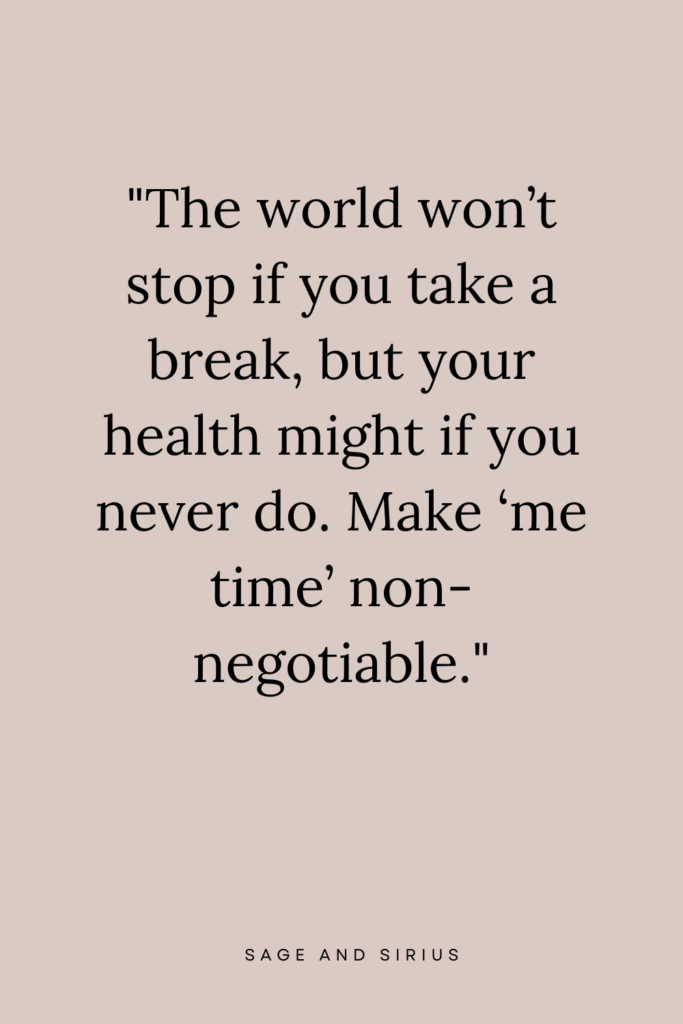
4. Practice Small Acts of Self-Care Daily
Self-care isn’t something that should be reserved for weekends or days off, it’s something we need to incorporate into our daily routines. That’s the key to making self-care a natural part of life instead of an occasional luxury.
Small acts of self-care throughout the day can make a huge difference. They break up long hours of stress and help reset our mood and mindset.
Think about it, if you work non-stop without taking breaks, by the end of the day, you’ll feel so exhausted and overwhelmed that you won’t have the energy for anything else.
You might end up skipping dinner or opting for takeout because cooking feels like too much effort. It becomes a domino effect, one unhealthy choice leads to another.
But if you take small and intentional breaks throughout the day, you prevent that buildup of stress.
A cup of tea or coffee between tasks, a five-minute stretch, stepping outside for fresh air, or even just closing your eyes for a moment, these little things help more than we realize.
If you’re unsure where to start, I share a simple self-care activity every day on my Instagram account. Maybe one of them will help you build this habit too!
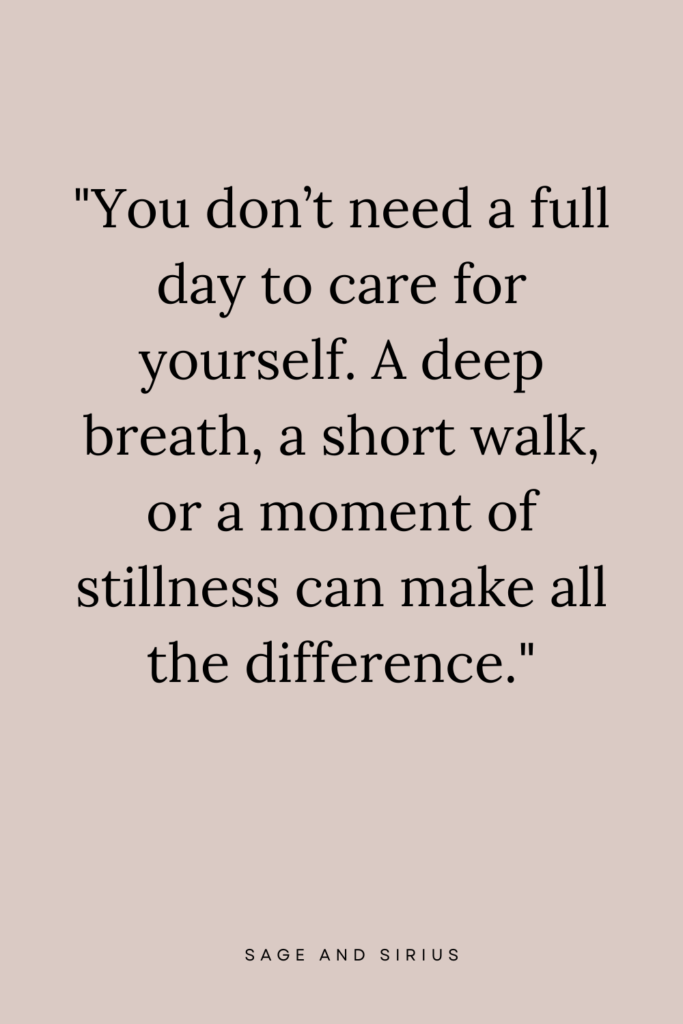
5. You Don’t Have to Earn Self-Care
One of the biggest misconceptions about self-care is that we have to “earn” it. Like we need to accomplish something extraordinary before we deserve to take a break or do something for ourselves. But that’s simply not true.
You don’t need to check off every task on your to-do list, be productive all day, or achieve something significant just to justify taking care of yourself.
Self-care is not a reward, it’s a necessity. Just like we eat when we’re hungry and sleep when we’re tired, we need to care for ourselves because we are human, not because we’ve “earned” the right to do so.
Think about it, would you ever tell a child that they need to finish all their homework before they can rest when they’re visibly exhausted? No, because you know they need rest to function well.
The same applies to us as adults. We are not machines. We don’t have to overwork ourselves before we allow ourselves time to breathe.
Self-care is for everyone, at all times, not just when we think we “deserve” it. The sooner we let go of that mindset, the easier it becomes to prioritize our well-being without guilt.
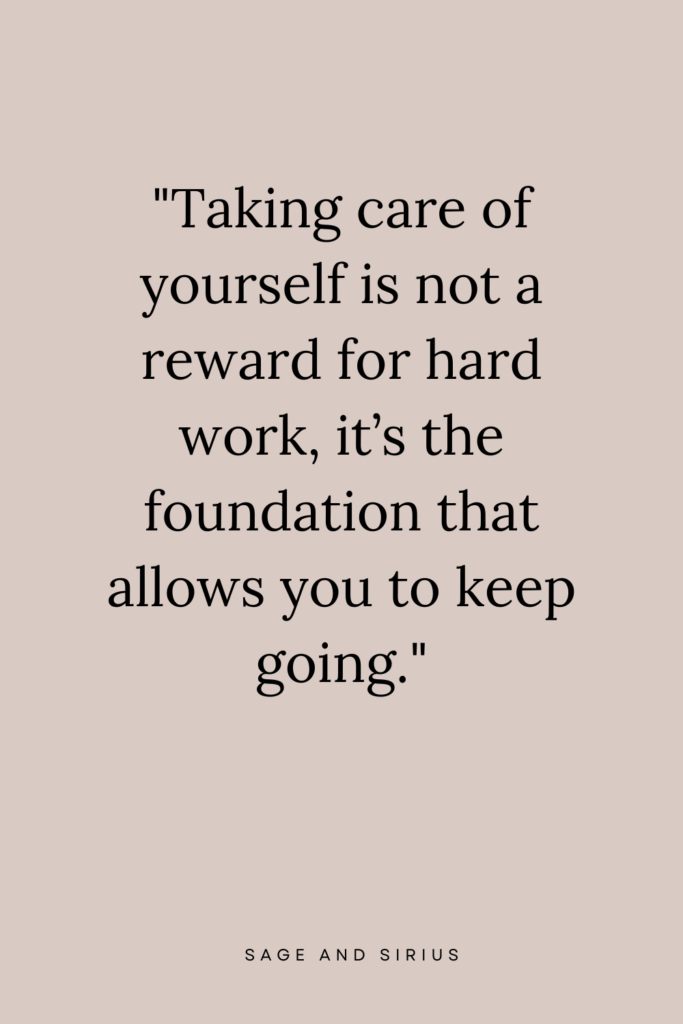
Wrapping Up – How To Stop Feeling Guilty about Practicing Self-Care
So many of us have grown up believing that we must always be productive and that sitting down and simply relaxing is somehow a waste of time.
Society conditions us to seek validation from others and makes us feel like we need permission to take care of ourselves. We hesitate, wondering if prioritizing our well-being is selfish when, in reality, it’s the most necessary thing we can do.
I won’t pretend that I have it all figured out. I am very much a work in progress. Saying no has never come easy to me. I’ve always had this habit of trying to please everyone, even at the cost of my own health and time.
But I’m learning, slowly but surely. Or rather, my husband is making sure I learn! He constantly reminds me that I don’t have to say yes to everything, whether it’s work or people. And you know what? It’s making a difference.
Because the truth is that if we don’t care for ourselves, how can we possibly show up for others as our best selves? We can’t pour from an empty cup.
I truly hope that the five ways we discussed in this blog help you understand how to stop feeling guilty about self-care.
If you have any other thoughts or suggestions, I’d love to hear them. Let’s remind each other that self-care isn’t selfish, it’s essential. Namaste!







Leave a Reply